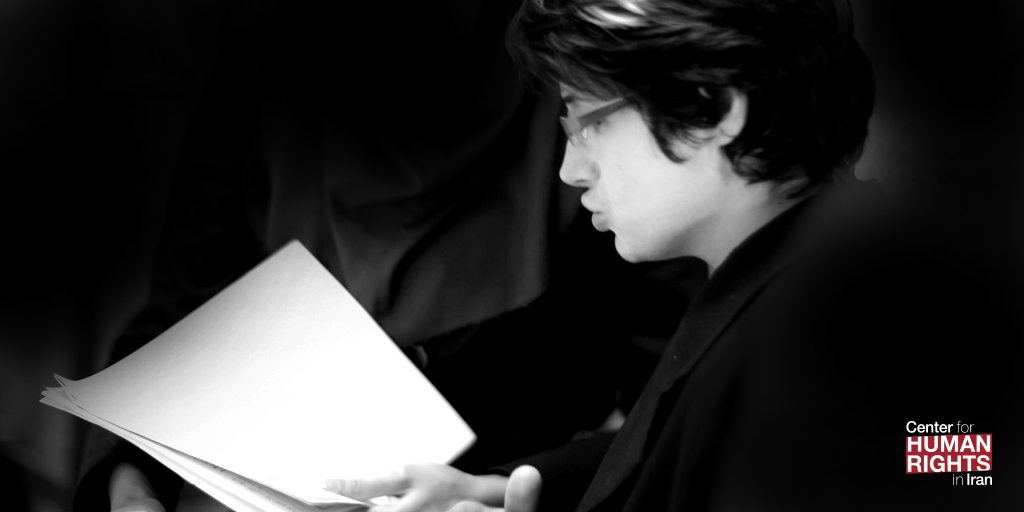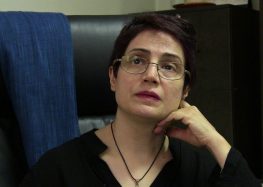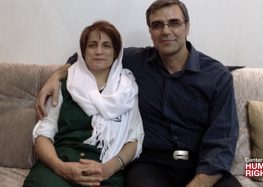Iranian Human Rights Lawyer Nasrin Sotoudeh Says She Has Been Sentenced to 38 Years in Prison

[Editor’s Note: Based on Nasrin Sotoudeh’s written notes of her verdict (she was denied a physical copy), which she gave to her husband one week after reporting her sentence of 38 years to him over the phone, Sotoudeh will serve 12 years of that combined sentence in prison (subject to appeal). Find a translation of those notes here.]
March 11, 2019 – Iranian defense attorney Nasrin Sotoudeh told her husband she has been sentenced to 38 years in prison and 148 lashes. Her statement follows media reports quoting the hardline judge overseeing her case who said she has been sentenced to seven years in prison.
“Sotoudeh has been sentenced in a Kafkaesque trial severely lacking in international standards of due process,” said Hadi Ghaemi, executive director of the Center for Human Rights in Iran (CHRI).
“The Iranian Judiciary is punishing Sotoudeh for trying to uphold the rule of law and the right to a fair defense in cases involving defendants facing politically motivated charges,” he added.
“First they went after the journalists, activists and dissidents,” he said. “Now they’re going after their only line of defense.”
Sotoudeh’s husband, Reza Khandan, wrote on Facebook on March 11, 2019, that his wife has been sentenced to 38 years in prison and 148 lashes (five years for one case and 33 years for a second case involving a combined total of nine charges). In January 2019 Khandan was also sentenced to six years in prison.
During a brief phone conversation with her husband, Sotoudeh insisted that her sentence is 38 years in prison and 148 lashes and should be reported in its original form regardless of whether it is later reduced.
“I don’t know how many years she got for each of the charges because my conversation with Nasrin only lasted a few minutes and we didn’t get to the details,” Khandan told CHRI. “I only know that the biggest sentence was 12 years for [encouraging people to] ‘corruption and prostitution.’”
The first sentence of five years appears based on a 2015 case in which she was tried in absentia by hardline Judge Mohammad Moghiseh.
Khandan told CHRI the second sentence is based on seven charges: “assembly and collusion against national security,” “propaganda against the state,” “membership in the Defenders of Human Rights Center, the Legam group (against capital punishment), and the National Peace Council,” “encouraging people to corruption and prostitution,” “appearing at the judiciary without Islamic hijab,” “disturbing public peace and order” and “publishing falsehoods with the intent to disturb public opinion.”
Sotoudeh was tried in absentia in Tehran on December 30, 2018, at Branch 28 of the Revolutionary Court presided by Judge Mohammad Moghiseh who is known for issuing harsh sentences in cases involving politically motivated charges.
On March 11, Moghisheh told a state-funded media outlet that Sotoudeh has been sentenced to seven years in prison. He did not elaborate but his comment could have been based on Article 134 of the Penal Code, which states that in cases involving multiple convictions, one should serve no more than the maximum punishment for the charge that carries the heaviest sentence.
Khandan said: “All I can say is that it’s shameful for Iran’s judicial system to issue such a heavy sentence against a human rights activist. This verdict shows that making statements in our country comes with such a high price that an attorney can be sentenced to 44 years for it. I say 44 years because in 2010 she was sentenced to six years in prison for similar charges… This sentence is unjust, illogical and unusual.”
Sotoudeh, 55, has been detained since June 13, 2018, after security agents unexpectedly appeared at her home and took her to Evin Prison in Tehran.
An outspoken human rights advocate with several international accolades, she previously served three years in prison from 2010-2013 and was released after years of campaigning for her freedom by international human rights organizations.
Sotoudeh was re-imprisoned after defending women who were arrested for protesting Iran’s compulsory hijab law. She has also publicly criticized the judiciary’s decision to force detainees facing politically motivated charges to choose their counsel from a list of lawyers approved by the judiciary.
Sotoudeh is among at least seven human rights attorneys who were arrested in Iran in 2018 in a widening crackdown aimed at further restricting detainees’ right to counsel.
“By trying to make an example out of this courageous human rights attorney, the Iranian judiciary is making a mockery out of any notion of ‘justice’ in Iran,” said Ghaemi.






